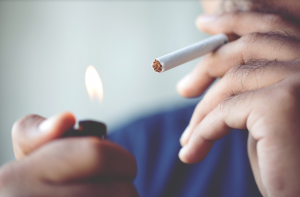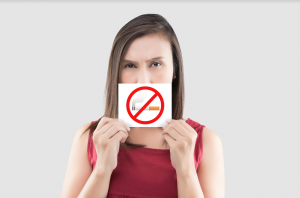 There is no longer any debate about there being many adverse effects associated with tobacco use in any form. Tobacco has strong and direct ties with many different types of cancer and oral concerns. However, there are still large amounts of misinformation swirling across the internet and popular culture. To dispel a number of those myths, we decided to tackle some of the most frequently asked questions about tobacco use and the effects that it has on your overall oral health.
There is no longer any debate about there being many adverse effects associated with tobacco use in any form. Tobacco has strong and direct ties with many different types of cancer and oral concerns. However, there are still large amounts of misinformation swirling across the internet and popular culture. To dispel a number of those myths, we decided to tackle some of the most frequently asked questions about tobacco use and the effects that it has on your overall oral health.
Why do teeth get stained from smoking?
First, it is essential to clarify that while smoking does have some additional factors that play into the yellowing or staining of teeth, this is true for other types of tobacco use as well. The ingredients within tobacco, typically the nicotine and tar, are responsible for giving your teeth a yellowish appearance.
Additionally, the actual smoke and heat from smoking help to further stain and seal the stains onto your teeth. Many heavy smokers will find that their teeth can actually appear brown from smoking rather than just yellow. In addition, the staining is often uneven and blotchy, attaching itself to impurities in the teeth.
How does tobacco use impact my oral health?
There are many negative side effects associated with the use of tobacco. One of the most overlooked aspects is the effect that tobacco has on your immune system. Research shows that using any type of tobacco depresses your immune system making you less ready to fight off infection and sickness. Smokers are more prone to having relatively small infections become a much bigger issue.
In addition, tobacco use leads to a buildup of more plaque than non-smokers. In turn, plaque leads to gum disease. To compound this problem even further, smoking reduces the amount of oxygen in the bloodstream, which prohibits your body’s ability to heal the gums. Currently, gum disease is the leading cause of tooth loss for adults.
The use of chewing tobacco also has a negative effect on your gums and can affect their ability to attach to the teeth properly. This leaves the roots of the teeth exposed to increased infection and cavity rates.
I know that smoking is linked to lung cancer, but what does that have to do with oral health?
While most of the focus on smoking is certainly linked to lung cancer, smoking and tobacco use is also the leading cause of mouth cancer. Even though this type of cancer gets less of the attention, it is still a potentially fatal condition and kills thousands of people every year.
Additionally, surgeries to remove cancer from the mouth can have a devastating effect on a person’s quality of life because teeth or substantial portions of the mouth must be removed in order to clear cancer. This can change how a person has to eat, speak, and even breathe.
 Aren’t there special toothpastes to remove yellowing from smoking?
Aren’t there special toothpastes to remove yellowing from smoking?
There are a variety of different products on the market that are targeted specifically at smokers because of their increased need for better oral care. Some of the most popular products are toothpastes that are designed to remove the yellowing caused by smoking. These toothpastes tend to be abrasive in order to scrape away the discoloration.
If you are considering using one of these toothpastes, you should speak with your dentist first. Abrasive toothpastes are not recommended for patients who have dental implants as they can scratch and damage the surface of the tooth. In addition, the prolonged use of abrasive toothpastes can remove the protective coating on your teeth, leaving them more vulnerable to infection.
How often should tobacco users see the dentist?
Currently, we still recommend that people who use tobacco products should come in just as regularly as non-smokers, twice a year. However, smokers often require more work than people who do not smoke due to the excess buildup of plaque and tartar on their teeth, and the likelihood that smokers may have more dental issues than non-smokers. While dental care is vital for everybody, tobacco users must be far more diligent with their oral health, because small problems can quickly become more severe for them.
What can a dentist do for me?
Dentists work with patients who smoke every single day, so any issues that smokers may be having have been seen before. A dentist may recommend specific products or help you dial in a better oral routine. However, if you would like to stop smoking, dental offices also carry information on how to help you quit.
Also, dentists will be sure to look for issues that more frequently affect the smoker, such as lesions in the mouth that can be indicative of cancer. These sores can be found on the cheeks, gums, tongue, or the roof of the mouth.
If you want more information or would like help quitting, call Lockhart Dental today at (317) 849-9715 to schedule your appointment and see the difference we can make in your life.



